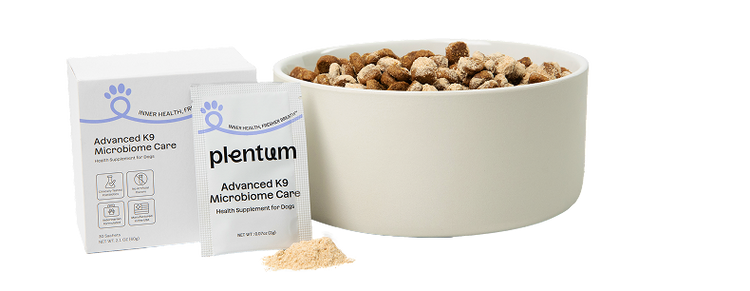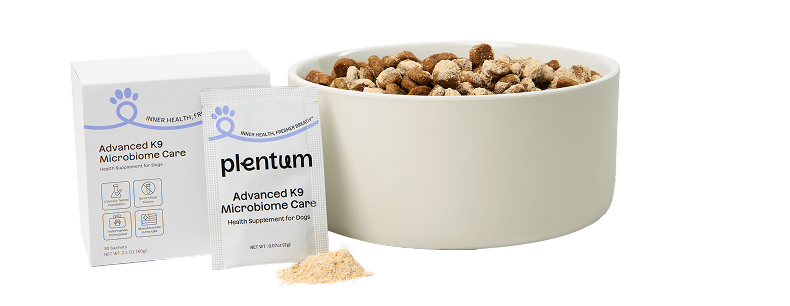
The concept may seem complex yet postbiotics work through their stable composition and secure nature while providing targeted health advantages. This article investigates canine postbiotics through the NIH resources of the global scientific community to explain their nature and advantages and their position as a promising wellness solution for dogs.
What Exactly Are Postbiotics?
Understanding the entire "biotics" family requires knowledge about prebiotics first.
Prebiotics function as non-digestible fiber sources that provide "nutrition" for beneficial gut bacteria. Good microbes thrive because prebiotics serve as garden fertilizer within your dog's intestinal system. Fructo-oligosaccharides (FOS) and inulin represent two common types of prebiotics.
Probiotics consist of "good bacteria," which represent living microorganisms that deliver health advantages when given in sufficient amounts. They are the seeds you plant in the garden.
Now, for the main event. In 2021 the International Scientific Association of Probiotics and Prebiotics (ISAPP) established that postbiotics consist of inactive microbial components which deliver health benefits to the host.1
The process of probiotic fermentation with prebiotics produces beneficial compounds, which make up postbiotics. The "harvest" from the well-tended gut garden is what these beneficial substances represent. These useful substances include:
- Short-Chain Fatty Acids (SCFAs): Compounds like butyrate, propionate, and acetate, which are vital energy sources for colon cells and have anti-inflammatory properties.
- The immune system receives immune-modulating signals through dead bacterial cell wall fragments, which include peptidoglycans.1
- Enzymes: Proteins that can help with digestion and nutrient absorption.
- Vitamins, such as Vitamin B and K, are produced by bacteria.
The inactive nature of postbiotics provides them with distinctive advantages because they do not contain living organisms.
The Postbiotic Advantage for Your Canine Companion
The emerging research on canine postbiotics shows encouraging results, although the scientific study of this field remains in its early stages. The scientific community is showing increasing interest in postbiotics due to their unique characteristics.
The stability and safety profile of postbiotics exceeds that of other microbiome-related products because they lack living cells. The enduring nature of postbiotics enables them to survive the journey through the digestive system so they can deliver their intended health benefits. The stable nature of postbiotics makes them suitable for dogs with weak immune systems since live bacterial introduction could pose a risk.
The non-active nature of postbiotics results in fewer adverse effects compared to probiotics because dogs tend to digest them better. Probiotics are generally safe, but some dogs may experience brief gas or bloating during microbiome adjustments. The inanimate nature of postbiotics leads to better digestive tolerance while reducing the likelihood of adverse reactions.
The targeted health benefits from postbiotics deliver the exact beneficial molecules that perform the functions we associate with gut health. These can include:
- The preferred energy source of colon cells requires butyrate as a key SCFA to sustain their health. The intestinal barrier becomes stronger when postbiotics enter the body because they help prevent dangerous substances from moving into the bloodstream (a condition known as "leaky gut").
- The immune system of dogs contains most of its immune cells in the gut. Postbiotics have been proven to help maintain immune system equilibrium according to scientific research. The scientific community has observed that postbiotics help control atopic dermatitis while fighting certain aspects of immunosenescence that affect senior dogs' immune systems.3
- Postbiotics containing SCFAs demonstrate strong anti-inflammatory properties among their many beneficial compounds. The gut inflammation reduces with this treatment, and the remedy produces systemic benefits that help manage inflammatory diseases like arthritis.
- The use of postbiotics in the nonliving state allows them to create conditions that will enable beneficial bacteria to thrive while forming a healthier gut ecosystem.
The Science Behind Postbiotics
The NIH does not maintain a separate webpage dedicated to "canine postbiotics," but PubMed Central (PMC) archives relevant studies in its database. The research now clearly demonstrates the advantages of the new studies.
- The Frontiers in Veterinary Science journal published a 2024 study that evaluated the prebiotic (scFOS) and postbiotic mixture effects on the immune systems of senior dogs. Research showed that the supplement protected against immune system deterioration during aging by enhancing the CD4+:CD8+ ratio, which serves as an indicator of healthy immune system function.3
- The research conducted by MDPI in 2024 demonstrated that a postbiotic supplement enhanced beneficial Lactobacillus species counts more rapidly in a simulated canine gut environment than probiotics alone.4
- The MDPI systematic review and meta-analysis of 2025 analyzed various studies. They established that postbiotics show evidence for improving gut microbiota and reducing inflammation and oxidative stress while improving immune response. However, more studies are needed to confirm these effects in dogs.2
When should you get a canine postbiotic supplement for your dog?
Canine postbiotic supplements serve as excellent choices for dogs who experience occasional digestive issues or skin problems or want a non-invasive method to enhance their general well-being. They are particularly well-suited for:
- Dogs with sensitive stomachs
- Senior dogs needing immune support
- Dogs with compromised immune systems
- A canine postbiotic supplement serves as a wellness product for healthy adult dogs.
The animal wellness field continues to advance with postbiotics being one of the most promising new developments in the sector. Postbiotics enable dog owners to provide their pets with gentle and scientifically supported inside-out health benefits through these beneficial compounds.
Your veterinarian should be consulted before giving canine postbiotics to your dog as a supplement because it requires proper guidance. Your veterinarian can assist you in picking a premium product while establishing the correct dosage for your dog's particular requirements.





